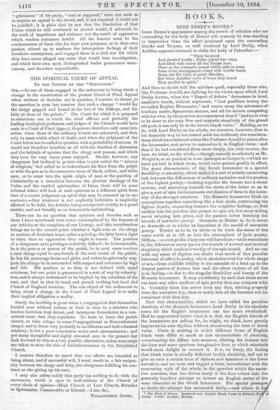THE SPIRITUAL COURT OF APPEAL. To THE EDITOR OF THE
"SPECTATOR."
Sin,—As one of those engaged in the endeavour to bring about a change in the constitution of the present Court of Final Appeal when matters of doctrine are in question, I venture to demur to the assertion in your last number that such a change "would lay the clergy gagged and bound at the feet of the Bishops, and the laity at those of the priests." The Court for which it is proposed to substitute one in which the chief officers and probably the leading theological professors and judges of the Church would have seats is a Court of Final Appeal, its powers therefore only come into action when those of the ordinary Courts are exhausted, and then only in cases which admit of doubt, and when the judgment of the Court below can be called in question with a probability of success It 'Would not therefore interfere at all with the freedom of discussion and the latitude of opinion that the clergy now possess, and which they have for very many years enjoyed. Should, however, any clergyman feel inclined to go into what is now called the "science of religions," feel called on to indoctrinate his flock from the pulpit or with the pen as to the successive races of black, yellow, and white men, or to enter into the apish origin of man or the position of Christianity as a transition between the glorious theology of the Vedas and the exalted spiritualism of Islam, there will be some tribunal which will look at such opinions in a different spirit from that of a recent judgmenta spirit that may be summed up in one sentence,—that whatever is not explicitly forbidden is implicitly allowed to be held, the Articles being interpreted strictly as a penal statute, and not broadly as an honourable undertaking.
There can be no question that opinions and theories such as those I have mentioned were never contemplated by the framers of our Articles or the compilers of our Liturgy, and this consideration brings me to the second point, whether a tight rein on the clergy in matters of doctrines is not rather a privilege the laity have a right to claim than an oppression they ought to resent. The position of a clergyman as to privileges is strictly defined ; he is irremovable, he is the parson or person of the parish, he in most cases receives a rent charge equal to one-fourth of the rack rental of the parish, he has his parsonage-house and glebe, and unless he grievously neg- lects his charge be is surrounded with respect and reverence by high and low. His position as to duty is not defined with equal strictness, but one point is guaranteed in a sort of way by subscrip- tion, and is always understood to be implied by his retention of his cure, and that is, that he teach and preach nothing but bond fled Church of England doctrine. The sole object of the endeavour to bring about a change in the Court of Final Appeal is to make their implied obligation a reality.
Surely the hardship is great when a congregation find themselves handed over without redress or limit in time to a minister who teaches doctrines they detest, and interprets formularies in a non- natural sense that they repudiate. To have to leave the parish church, to take refuge in some Congregational or Nonconformist chapel, and to listen very probably to an illiterate and half-educated ministry, is but a poor consolation under such circumstances ; and yet many thoughtful and highly educated men in the present day look forward to this as a very possible alternative, unless some steps are taken to stem the tide of latitudinarianism in the Established Church. * I venture therefore to assert that our efforts are intended to bring about, and if successful will, I trust, result in, a fair recipro- 'city between the clergy and laity, the clergyman fulfilling his con- tract or else giving up his cure.
I may also affirm safely that party has nothing to do with the movement, which is open to well-wishers of the Church of every shade of opinion—High Church or Low Church, Ritualist 'or Spiritualist, Conservative or LiberaL—I am, &c.,
WILLOUGHI3Y JONES,






























 Previous page
Previous page